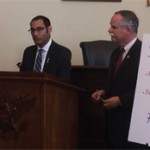Imagine you’ve just heard a compelling presentation urging all ACR members to contribute to RheumPAC, the ACR’s political action committee. RheumPAC’s mission is to support politicians who support issues important to rheumatologists. You are impressed by the role RheumPAC has played in a number of issues you support. Just as you’re writing a check, you…

Why Rheumatologists Should Join the AMA
Editor’s note: Welcome to the first installment of Experiences in Advocacy, a special series authored by ACR members detailing personal experiences in advocacy. We need rheumatologists to join the American Medical Association (AMA). Here’s why, and how to do it. Having participated in your delegation for over a decade, I have seen major improvements in…

Rheumatologists, Patient Advocacy Efforts Make a Difference
We’re in this together for rheumatology and our patients. Those who know me appreciate my devotion to Duke Basketball and my pride in their recent NCAA championship. Coach K (Krzyzewski), a firmly established leader in the world of college basketball, makes the analogy that a basketball team is like five fingers on a hand, and…
Congress’ District Workweeks in August Prime Time for Rheumatology Advocacy
Each year in August, lawmakers return home for the summer recess and convene district workweeks. That means you have the opportunity to meet with members in their local offices, attend fund-raisers nearby or participate in a town hall. This is where our strength as a membership organization can benefit us most. We have real physicians…

How to Launch Successful Rheumatology Patient Advocacy Programs
Editor’s note: This is the second installment of a two-part series showing how a busy office-based practice can incorporate patient advocacy into its standard workflow. In Part 1, we looked at the reasons for incorporating patient advocacy into your practice and offered an outline for implementing it. Part 2 amplifies the concepts explored in Part…
The ACR Partners with Coalition, Patient Advocacy Groups to Advocate for Rheumatology
In terms of getting our message heard in Washington, D.C., rheumatology faces a David vs. Goliath battle on several levels. Many industries have far greater resources, use multiple lobbying firms, and have advertising and lobbying budgets that eclipse ours by several hundred-fold. Rheumatology is far smaller than most other medical specialties; our membership is a…
RheumPAC Calls on the ACR, ARHP Members to Support Advocacy Efforts
Dear ACR and ARHP Colleagues, In 2007, the ACR created RheumPAC as the need for strong advocacy for rheumatologists and their patients and rheumatology training and research became compelling. The Government Affairs Committee was adept at developing novel ideas and strong policies, but there was a notable gap between policy and politics. RheumPAC was started…

How Rheumatologists Can Mobilize Patients as Advocates, Activists
Editor’s note: This is the first installment of a two-part series showing how a busy office-based practice can incorporate patient advocacy into its standard workflow. Part 1 outlines the reasons for advocacy and the benefits to both patients and doctors, then gives a quick-start outline to get you started. Part 2 will amplify the concepts…

The ACR, Rheumatologists Advance Issues Through Advocacy
Rheumatologists and rheumatology health professionals make a difference every day in the lives of patients. And through the work of many devoted members, the College takes that commitment beyond the care setting and into the policy arena to Advance Rheumatology! on Capitol Hill and in state capitols across the country. I want to take a…

Rheumatology Research Foundation Hits 30-Year Milestone
At the 2014 ACR/ARHP Annual Meeting in Boston, the Rheumatology Research Foundation staff sat down with a few ACR and ARHP members to get their take on what the Foundation’s 30th anniversary means to them. We spoke with current and former leaders of the Foundation and the ACR, as well as numerous Foundation award recipients,…
- « Previous Page
- 1
- …
- 12
- 13
- 14
- 15
- 16
- …
- 30
- Next Page »